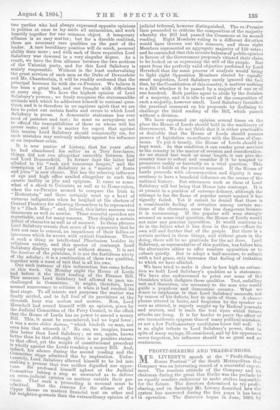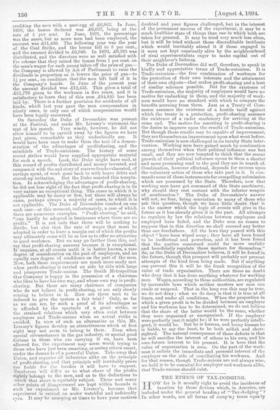PROFIT-SHARING AND TRADE-UNIONS.
MR. LIVESEY'S speech at the " Profit-Sharing Bonus Festival" of the South Metropolitan G1A8 Company was an interesting record of a successful experi- ment. The resolute attitude of the Company and its chairman during the great Gas Strike was the prelude to an equally resolute endeavour to make strikes impossible for the future. The directors determined, to try profit. sharing, and on Saturday Mr. Livesey described how the system has answered during the five years it has been in operation. The directors began in June, 1889, by crediting the men with a nest-egg of 46,863. In June, )890, the bonus declared was 46,037, being at the rate of 5 per cent. In June, 1891, the percentage was the same, but as more men had been employed, the amount was 411,400. The following year was the year of the Coal Strike, and the bonus fell to 3 per cent., and the amount divided to 46,648. In 1893, 48,395 was distributed, and the directors were so well satisfied with the scheme that they raised the bonus from 1 per cent. on the men's wages for each penny taken off the price of gas— the Company is allowed by Act of Parliament to raise the dividends in proportion as it lowers the price of gas—to 11 per cent., on condition that the men left half of it in the Company's hands. In June of the present year the amount divided was 412,435. This gives a total of 451,778 given to the workmen in five years, and it is satisfactory to learn that of this sum 444,845 has been laid by. There is a further provision for accidents of all kinds, which last year gave the men compensation in ninety cases, in only one of which compensation would have been legally recovered. On Saturday the Duke of Devonshire was present at the Festival, and made Mr. Livesey's statement the text of his speech. Very wisely, however, he did not allow himself to be carried away by the figures we have just given, remarkable as they undoubtedly are. It would have been easy to make them the text of a demon- stration of the advantages of profitsharing, and the 'mischiefs of Trade-unionism. The history of some recent strikes would have supplied appropriate material for such a speech. Look, the Duke might have said, at this record of profits distributed and money invested, and compare it with the sad story of reserve funds exhausted, of savings spent, of work gone back to with heavy debts and stored-up irritation. But the Duke resisted this tempta- tion. In acknowledging the advantages of profit-sharing, he did not lose sight of the fact that profit-sharing is in its very nature an exceptional thing. The cases to which it is applicable may be many or few, but there will always be -eases, perhaps always a majority of cases, to which it is not applicable. The Duke of Devonshire touched on one such case—at this moment, unfortunately, a case of which there are numerous examples. "Profit-sharing," ho said, -":can hardly be adopted in businesses where there are no profits." It is not only that there will be nothing to divide, but also that the rate of wages that must be adopted in order to leave a margin out of which the profits may ultimately come will be so low as to offer no attraction to good workmen. But we may go farther than this, and say that profit-sharing answers because it is exceptional. It requires, at all events until it is better known, a rare degree of consideration on the part of employers, and an equally rare degree of confidence on the part of the men. Now, both these requirements are much more easily met when profit-sharing is carried on side by side with large and prosperous Trade-unions. The South Metropolitan -Gas Company is happy in the possession of a chairman who likes to have his own way, and whose own way is profit. sharing. But there are many chairmen of companies who do not believe in profit-sharing, or are only slowly coming to believe in it. How are these men to be induced to give the system a fair trial ? Only, so far as we can see, by such a proof of its advantages as is afforded by the spectacle of a great strike, or the strained relations which very often exist between employers and Trade-unions when an actual strike is avoided. In view of such an alternative as this, Mr.
Livesey's figures develop an attractiveness which at first eight may not seem to belong to them. Even when special circumstances in the gas industry, or special good fortune in those who are carrying it on, have been allowed for, the experiment may seem worth trying to those who have just been smarting, or seeing others smart, under the demands ef a powerful 'Union. Take away that Union, and organise all industries alike on the principle -of profit-sharing, and that, principle will inevitably prove too feeble for the burden it will have to support. Employers 'will difbr as to what share of the profits rightly belongs to the men and as to the deductions to which that share is equitably subject. These and many other points of disagreement are kept within bounds in such an experiment as Mr. Livesey's, because that experiment is carried on under watchful and unfriendly eyes. It may be annoying at times to have your motives doubted and your figures challenged, but in the interest of the permanent success of the experiment, it may be a much healthier state of things than one in which both are taken. for granted. It may be tried very much less often, but it will be tried without those discreditable incidents which would inevitably attend it if those engaged in it were not kept constantly alive by the neighbourhood of rival experimentalists eager to make capital out of their neighbour's Whites.
The Duke of Devonshire did well, therefore, to speak in kindly and appreciative terms of Trade-unionism. It is Trade-unionism—the free combination of workmen for the protection of their own interests and the attainment of their own objects—that makes profit-sharing and a host of similar schemes possible. But for the existence of Trade-unionism, the majority of employers would have no motive for embarking in them, and the majority of work- men would have no standard with which to compare the benefits accruing from them. Just as a Treaty of Com- merce assumes the existence of a hostile tariff against which the treaty is a protection, profit-sharing assumes the existence of a ruder machinery for arriving at the same end. The motive for resorting to profit-sharing is the desire to improve upon the results of Trade-unionism. But though these results may be capable of improvement, they are themselves an improvement upon what went before. Trade-unionism is now challenged in its turnby State inter- vention. Working men have gained much by combination among themselves when their political influence was but small, and they are now tempted to think that the recent growth of their political influence opens to them a shorter and more promising road to the goal they are in search of. Combination, however effectual, depends for success upon the voluntary action of those who take part in it. It com- mands none of those instruments for compelling submission which are possessed by the State. Therefore, now that working men have got command of this State machinery, why should they rest content with the inferior weapon of combination ? The Duke of Devonshire's answer will not, we fear, bring conviction to many of those who ask this question, though we have little doubt that it is the answer which the logic of events will give in the future as it has already given it in the past. All attempts to regulate by law the relations between employers and employed have failed, and the Duke sees no reason to suppose that in this direction we shall succeed any better than our forefathers. All the laws they passed with this object "have been wiped away ; they have all been found to be ineffectual and powerless, and it has been found that the parties concerned could far more usefully and beneficially regulate these matters for themselves." So, as the Duke of Devonshire believes, it will be found in the future, though this prospect will probably not prevent attempts of the kind from being made. But if anything can prevent this it will be the frank recognition of the value of trade organisation. There are those no doubt who deny that it has done anything whatever for working men. Wages, according to these authorities, are regulated by inexorable laws which neither masters nor men can evade or suspend. That in the long run this may be true. we do not deny ; what we do deny is that it is true at all times, and under all conditions. When the proportion in. which a given profit is to be divided between an employer and his workmen has to be determined, we do not believe that the share of the latter would be the same, whether they were organised or unorganised. If the employer were perfectly just it might be ; if he were perfectly intelli- gent, it would be. But he is human, and being human he is liable, to say the least, to be both selfish and short- sighted. The natural consequence of these defects is that he will sacrifice the interest of others to his own, and his own future interest to his present. It is here that the value of organisation is seen. On the part of the work- man it enlists the immediate and personal interest of the employer on the side of conciliating his workmen. And for that reason, though Trade-unions are not always wise, we hold it to be essential for employer and workmen alike, that Trade-unions should exist.



































 Previous page
Previous page